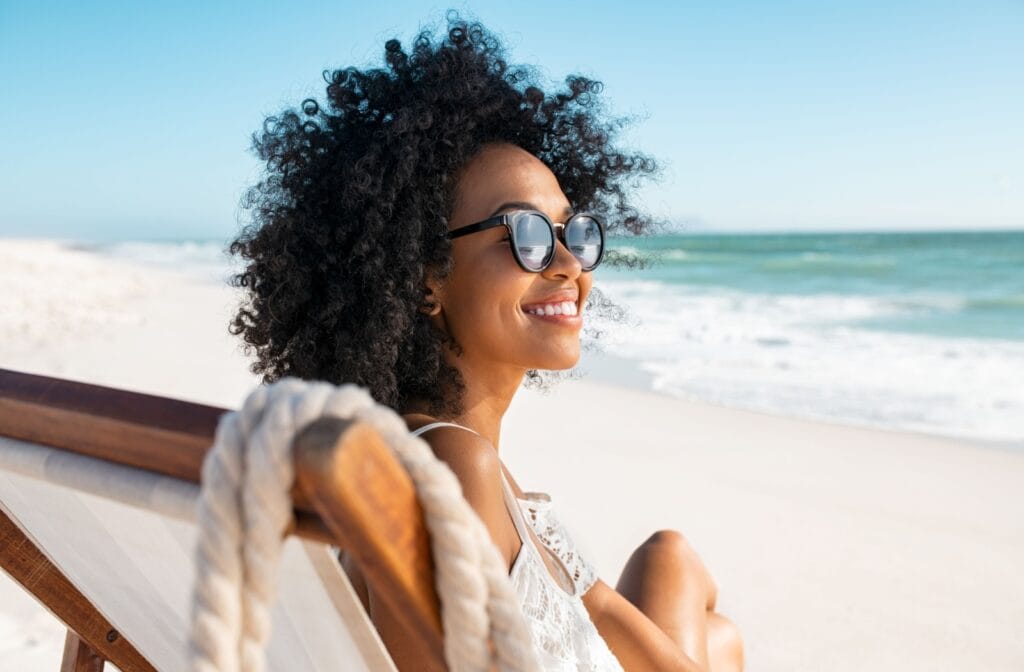Sunglasses do more than complete an outfit or shield your eyes from bright light. Many are equipped with features that contribute to long-term eye health, polarization being one of the most popular. But while polarized sunglasses help improve comfort outdoors, people often wonder: do they also block UV rays?
The short answer is no, not automatically. Polarized lenses and UV protection address different issues, and not all sunglasses offer both. To protect your eyes and see more clearly in sunny conditions, it’s important to understand the role each feature plays and how to identify a pair that offers both.
What Polarized Lenses Do
Polarized lenses are designed to reduce glare, especially from flat, reflective surfaces like roads, lakes, or snow. They do this by using a special filter that blocks horizontal light waves. The result is a much more comfortable visual experience in bright or high-glare settings.
Some of the benefits of polarized lenses include:
- Clearer, sharper vision in bright light
- Reduced eye strain and fatigue
- Improved contrast and visual comfort during outdoor activities
People who spend time on the water or drive frequently often find polarized lenses to be helpful. The visual clarity that they provide can make it easier to see details and reduce the need for squinting, both of which can also contribute to long-term comfort.
Why UV Protection Matters
Ultraviolet (UV) protection is different. It refers to a lens’s ability to block invisible UVA and UVB rays from the sun. These rays can cause damage to the eye’s surface and internal structures, even on cloudy days or in winter.
Consistent exposure to UV rays is linked to several eye health issues, including:
- Cataracts
- Macular degeneration
- Photokeratitis (sunburn of the eye)
- Pterygium (growth on the white of the eye)
Because the effects of UV damage build up over time, wearing UV-blocking sunglasses is an important part of protecting your vision long-term.
Are Polarized Sunglasses Also UV-Protective?
Not by default. While many modern polarized sunglasses do include UV protection, polarization alone doesn’t block UV rays. It’s a separate lens feature. That’s why it’s important to look for sunglasses that specifically mention 100% UVA and UVB protection or are labeled UV400.
When shopping, don’t assume polarization covers all the bases. A dark lens can reduce brightness, but without UV protection, it may still allow harmful rays to reach your eye.
Why You Need Both
To get the best of both worlds, you’ll want sunglasses that offer both polarization and full UV protection. This is especially important for people who spend extended time outdoors, such as athletes, drivers, or those with sensitive eyes.
Together, polarized and UV-protective lenses offer:
- More comfortable vision in bright or reflective environments
- Protection against long-term sun-related eye damage
- A safer, clearer visual experience during daily outdoor activities
Wearing one without the other may leave your eyes vulnerable or limit the benefits of your sunglasses.
Prescription Options for Polarized UV Protection
If you wear corrective lenses, you can still enjoy the benefits of both UV protection and polarization. Prescription sunglasses are available with polarization and UV protection, offering all the same advantages in a vision-correcting format.
These lenses can be tailored to your lifestyle, whether you need them for driving, outdoor work, or recreational sports. They can also be integrated into wraparound frames or more fashion-forward styles, depending on your preferences.
The Role of Your Optometrist

With so many choices available, it can be tough to tell which sunglasses offer full protection just by looking at them. That’s where your optometrist comes in. We can recommend polarized sunglasses that also offer UV protection.
It’s a good idea to seek professional advice before buying sunglasses, especially if you:
- Have a history of eye conditions or sensitivity
- Need prescription lenses
- Spend a lot of time outdoors or near water
An optometry clinic can test your lenses for UV protection, explain the differences between lens materials, and help you find a comfortable, effective pair.
Consistent Use Is Key
Even the best sunglasses won’t help if they stay in your bag. UV rays reach your eyes year-round, including on overcast days and during winter. Reflective surfaces like water, pavement, or snow can intensify exposure, making sunglasses important even when it doesn’t feel especially sunny.
Wearing your sunglasses regularly can help reduce cumulative UV damage and make outdoor activities more comfortable.
Choosing the Right Pair
The best sunglasses offer a balance of comfort, clarity, and protection. Look for lenses that:
- Block 100% of UVA and UVB rays (UV400)
- Are polarized to reduce glare
- Fit comfortably and stay in place during movement
Labels and branding can sometimes be unclear, so don’t hesitate to ask us for guidance. A professionally fitted pair offers both aesthetic appeal and practical protection.
A Personalized Experience
At ERC Optometry, eye health is always our priority. Our team offers guidance on selecting polarized sunglasses that also block UV rays, helping patients find eyewear that fits their lifestyle, looks great, and supports their long-term vision. Whether you need prescription lenses or want to upgrade your summer essentials, don’t hesitate to book an appointment now.

